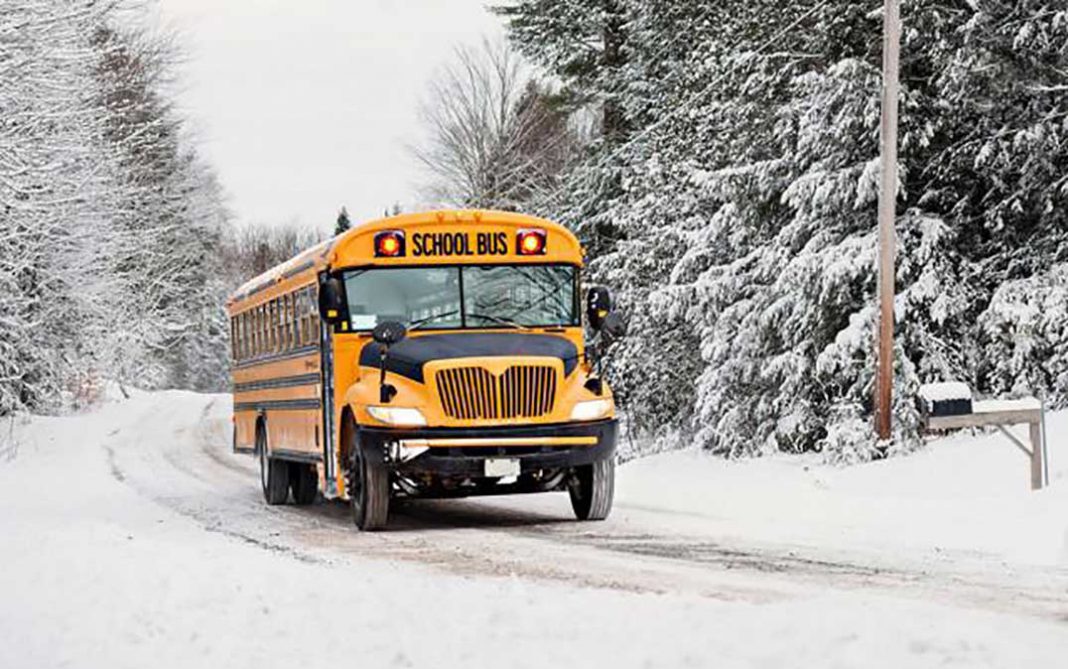MANITOULIN—The January deep freeze had numerous impacts on Manitoulin Island and across Northern Ontario, especially with crews fighting to keep roadways passable and ensuring everyone could travel to the places where they needed to be.
Last Monday, January 28 was the first time since 2014 that school buses had been cancelled across the entire district due to the cold.
“This doesn’t happen often,” said Renée Boucher, executive director of the Sudbury Student Services Consortium, an organization that oversees school bus transportation in the Sudbury and Manitoulin districts and as far west as Massey. She said the organization has chosen -35° Celsius as the temperature below which it must cancel all bus services.
“When it’s close to or almost reaches -35° at the Sudbury airport, our experience has been that all the outlying communities in general have a five- to 10-degree colder temperature. That’s what we’ve seen (last) week—it was -35° at the Sudbury airport but it was -40° in many municipalities,” said Ms. Boucher.
On that day, temperatures at the airport dropped as low as -41° Celsius at 6 am, with wind chill values as low as -50°. In addition to putting children at risk when waiting for the bus in the cold, Ms. Boucher said it also causes havoc for their vehicles.
“With their new technology, these better or ‘greener’ buses are better for the environment but not as good in cold weather. Even (last Thursday) on Manitoulin, one bus, as it was driving and doing its run, was gelling up and stalling so we had to transfer the students onto another bus,” said Ms. Boucher.
According to statistics from the consortium, there have been five days so far this winter where buses have been cancelled. In both the winter of 2012-2013 and 2017-2018, there were six days of cancellations, meaning this season has not yet set a record for total days cancelled.
Winter is not yet over, though, and it could still deliver challenging days ahead with more cancellations. That is, of course, unless you trust the forecasting prowess of Wiarton Willie who predicted an early spring on Groundhog Day this past Saturday.
Bus cancellations can have significant impacts on students and their school activities.
“I know (last) week, the students were writing exams, so the schools and school boards had to push those back,” said Ms. Boucher. “There’s an impact on parents as well, because they have to find a way to drive their children into school or find daycare providers for their children.”
Manitoulin Secondary School (MSS) faced multiple days of weather disruptions during its busy exam period; Friday, January 25, Monday, January 28 and Wednesday, January 30 were all called off with the last of the exams taking place over the whole day on Thursday, January 31, according to The Expositor’s Kids in the Hall columnist Rachael Orford.
Ms. Boucher stressed the importance of planning ahead and preparing contingency plans for when these situations occur, which will inevitably happen at various times during the winter months.
“Something we always remind parents at the beginning of the school year—when we have first time rider sessions for new students—is to always ensure they have a plan B. Plan B is for specific days like (last) week, when a bus is late or cancelled due to inclement weather,” she said.
Even when the weather is not cold enough to warrant a unilateral bus service cancellation, individual areas can still face shutdowns. Every bus operator company has operations managers or safety officers out on the road through the middle of the night to assess road conditions and report back to Ms. Boucher’s organization.
There is a special focus on hills, ice conditions and plow status. She said she also looks at weather statements from Environment Canada and Ontario Ministry of Transportation (MTO) advisories.
“With the six bus operators together, we talk about safety and if they have enough vehicles,” said Ms. Boucher. Most companies have 10 percent more vehicles than required, to serve as spares in case the vehicles don’t start or break down en-route.
“Our decision is taken at that point, then I contact the four directors of education for the four school boards and talk about the conditions of the roads, and the boards may decide to close the schools,” Ms. Boucher says.
Her organization serves 20,000 students per day. In the region, there are 400 buses traveling a combined 46,000 kilometres—that’s more than the circumference of the Earth. She says with that amount of distance to cover, there are a lot of varying conditions that drivers can encounter, including having to drive on cul de sacs, over hills, next to the hundreds of area lakes and down sideroads that may not be as well serviced.
“Our drivers leave earlier in the morning to get to their first stop on time, but they may be delayed a little bit more at each stop after that. The last child may be delayed by 30 minutes at that point,” said Ms. Boucher. “We have a lot of kilometres to navigate before our last stop; it’s not as easy as parents might believe.”
She added that people on Manitoulin Island have been excellent partners in helping to assess and manage winter road conditions in her time at this role.
“The townships on Manitoulin have been absolutely great; they communicate what they see to our school bus operators out there, make sure the roads are clear for buses and if they know there’s an issue where they will not be able to have the roads clear, they provide us with that information as well. They’ve been terrific to work with and I do thank them,” Ms. Boucher said.




